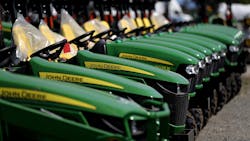Storms, drought, insect plagues, trade wars—venerable farm equipment company Deere & Co, (IW 500/38) , like the farmers it serves, is used to uncertainty. Some of those uncertainties are ultra-intense this year, with flooded fields delaying corn-planting season and China further tariff-ing U.S. soybeans. The dour economic mood is reflected in Deere’s scaled-back profit forecasts this year, but the fallout could have been worse had Deere not had a built-in plan to prioritize development of predictive technology in its machinery, using connectivity and artificial intelligence to help its customers decide when is best to plant and under what conditions.
Leading the company’s tech charge has been John May, who this week was named Deere CEO after a brief stint as the company’s chief operating officer. May spent the previous six years as head of agricultural solutions and chief information officer. During that time, he led Deere’s deal to acquire Blue River Technology, a company that uses computer vision and machine learning to apply herbicides on a plant-by-plant basis, with the potential to dramatically reduce herbicides used. He also helmed the deal to purchase Precision Planting, manufacturer of high-tech planting equipment, which the Justice Department scuttled on antitrust grounds.
Last year, May spoke about the rise of IIoT in farming to a U.S. House Subcommittee exploring the need for better broadband in rural communities.
“We are seeing the emergence of productivity-boosting concepts such as artificial intelligence and machine learning,” he said. “These technologies have game-changing promise in terms of improving yields and making more efficient use of fertilizers, herbicides and other chemicals. … Decisions once made at the field level are evolving to section-level, row level, even to the plant level.”
He added that the extent of the lack of connectivity in remote areas was hard to assess. “We know, for example, the rate of successful connections between our John Deere customers and our data management platforms," he stated. "That tells us that there are missed opportunities for producers to fully leverage the benefits of their data. But we don’t know the extent of successful connections experienced by producers using other platforms. And we don’t know about connections that are never made because the producer, knowing he has poor coverage, never invests in the technologies and solutions that could improve his productivity. The nature and extent of this problem is exactly why federal broadband policies and programs should focus on the needs of farmers and ranchers. Without a better understanding of the problem, we can’t begin to design the right solutions.”
Rod Walker, managing director at strategy execution and change management firm Kotter, said in written comments to IndustryWeek that more broadly, the challenge for May will be making Deere “more efficient and profitable” without dialing back on innovation. He will need to cut costs, while not taking “too much ‘punch’ out of the organization, which could affect innovation and limit the company’s ability to respond when the growth opportunities arise in the future.”
Deere announced recently that it was shooting for a 15% operating margin by 2022 with cost reduction a priority, and scaling back production by 20% at its Iowa and Illinois factories.
Paul Ericksen, the head of IndustryWeek’s Supply Chain Initiative and a former Deere supply chain manager, worked with May during his time there. He calls May “a real numbers guy, but with the common sense to do the right thing."
“Back in the day,” comments Ericksen, May was “highly focused on strategic plans and their execution,” but “at the same time able to deal with more tactical, day-to-day issues in a manner aligned with those plans.” Along with that, he was “just a real nice guy.”
Missouri-based analyst Holmes Osborne, of Osborne Global Investors, states that Deere has always been cyclical and that “Deere is well-positioned because they still make the best product in row crop farming.”
*The original version of this article incorrectly stated May's name.
About the Author

Laura Putre
Senior Editor, IndustryWeek
As senior editor, Laura Putre works with IndustryWeek's editorial contributors and reports on leadership and the automotive industry as they relate to manufacturing. She joined IndustryWeek in 2015 as a staff writer covering workforce issues.
Prior to IndustryWeek, Laura reported on the healthcare industry and covered local news. She was the editor of the Chicago Journal and a staff writer for Cleveland Scene. Her national bylines include The Guardian, Slate, Pacific-Standard and The Root.
Laura was a National Press Foundation fellow in 2022.
Got a story idea? Reach out to Laura at [email protected]
